(VOVWORLD) - Though best known as a poet, Rabindranath Tagore was a man of many talents. The first Indian to win a Nobel Prize for literature, he wrote and composed a wide array of songs, including India’s national anthem. He was a pedagogue who established a university that challenged the conventional form of education, and also a painter, whose style played an important role in modernising Bengali art. Dr. G.B. Harisha, Director of the Swami Vivekananda Cultural Centre will tell us more about Tagore, his global impact, as well as his trip to Saigon (now Ho Chi Minh City) back in 1929.
VOV reporter: Thank you so much, Dr. Harisha, for joining us today and sharing about India’s renowned poet Rabindranath Tagore. Can you tell us more about Tagore, his ideas and their impact on India and the world?
Dr. G.B. Harisha: Thank you. Basically, when you’re an artist, you may be born in any country but you belong to the entire world. Because poetry, music, and painting can touch the soul of every person who is sensible. He or she may be sitting in any part of the world. Really, a good poet can stand the test of time when he or she touches the souls of citizens of countries to which he or she does not belong . That can be the touchstone. Tagore and his works have passed the test given by time, which we call “Kala Mahakala,” which is the symbol of time in India. The Indians think of every culture and every person as our friend. There’s a chant in India’s Rigveda book which states that we should let the noble thoughts come from every corner of the world. That thought is very well-established in Tagore’s poetry. Although Tagore was not formally educated, he’s one of the greatest educators of the world. His father let him to choose to learn whatever he wanted to and the tutor used to come to his home to teach him. He understood that a formal education might help people become more disciplined but less creative, less imaginative, and they may lose their balance and connection with nature.
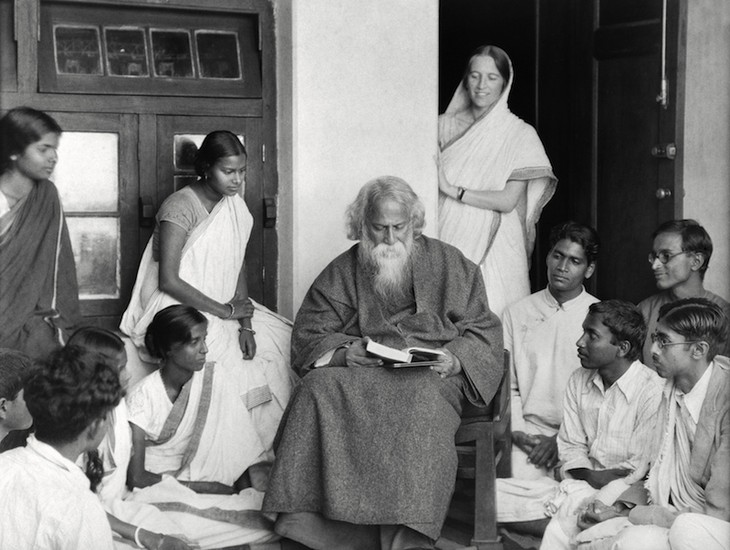 Tagore with his students at Shantiniketan. (Photo: internet) Tagore with his students at Shantiniketan. (Photo: internet) |
VOV reporter: Rabindranath Tagore was awarded the Nobel Prize for Literature in 1913 thanks to his profoundly sensitive, fresh and beautiful verse, expressed in his own English, which have become a part of the literature of the West. He is also known as the composer of two national anthems, one of India and the other of Bangladesh. Can you tell us more about this?
Dr. G.B. Harisha: Normally a poet writes and a nation may choose his words to make their national anthem. Tagore was a great patriot. He loved his motherland, which is part of India. The song was written in 1905 during the partition of Bengal, when the ruling British Empire divided India's Province of Bengal into two parts. During a big festival there, Tagore called on the people to “take mountains and rivers" and after that all the people, regardless their differences, tied one knot of protection, which is called “Rakhi” in Indian, indicating that “I’m your brother, you’re my sister”, that kind of unity. He brought about that unity among people not by politics but with culture through the celebration of the festival. During India’s struggle for independence, Tagore wrote many poems, about nature and love, as well as children’s literature. On top of that, he also wrote Jana Gana Mana, which was chosen as our national anthem. And also our sister country Bangladesh chose Tagore’s poetry to make their national anthem.
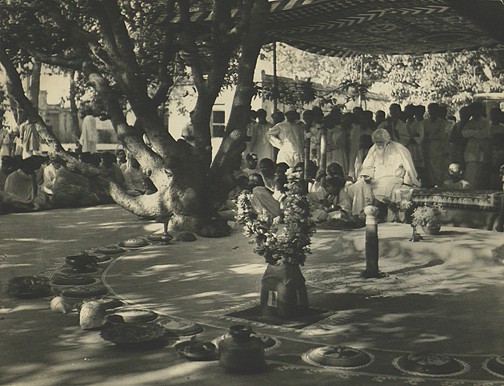 Tagore at Shantiniketan. (Photo: internet) Tagore at Shantiniketan. (Photo: internet) |
VOV reporter: So we can say that Tagore is a man of many talents. Is it true he was also an educator, and even though he avoided classroom education he founded his own university?
Dr. G.B. Harisha: Tagore founded Shantiniketan and another institution which is now a big university called Visva Bharati University. His idea was that there’s some energy inside every child and education has only to uncover it. Every person is like a gem and it is the duty of the educator to uncover their capabilities given by nature, family, society according to each child’s ambition, capabilities and talents. He combined technical education, philosophical education and practical education like vocational training. People should know carpentry, as well as something related to conceptual study and something related to religious life. Once people get an education, they should not depend on others to give them jobs, they should be job creators. They can be a part-time worker or a full-time worker, depending on how they choose. He gave a new definition to education and lifestyle: you can get money or whatever you need by doing what you choose and love in a very relaxed way. He combined life and work in a very beautiful way.
One more point to add about Tagore: there’s no deadline for talents and ambition. At school we often set targets about what we want to do and to get in 10 years, 20 years. Tagore did not care for that. Almost at the age of 70, he found his love for painting. The world of painters now considers him one of the greatest painters. So at the age of 70, you can start something new and new talents can be uncovered at any ages.
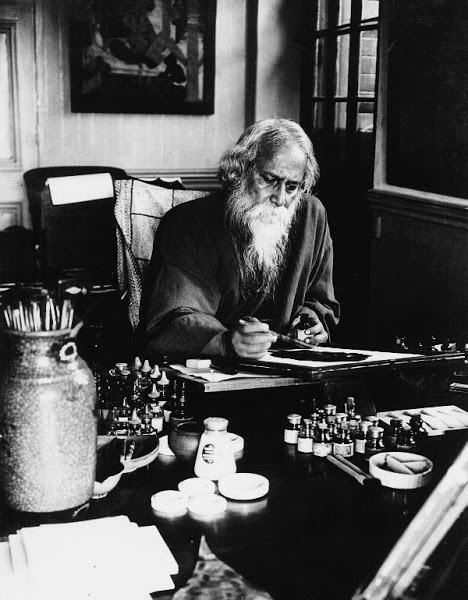 Tagore starts painting at his 70s. (Photo: internet) Tagore starts painting at his 70s. (Photo: internet) |
VOV reporter: Back to Tagore’s trip to Saigon (now Ho Chi Minh City) in June, 1929. Tagore's three days of visiting Saigon 90 years ago really made a mark on the history of cultural exchange between Vietnam and India. What was special about that trip? Why was a foreign poet so much loved and welcomed in Saigon back then?
Dr. G.B. Harisha: His trip to Saigon was part of his visit to countries in Indochina, including Laos. There are two points I want to make. First of all, Tagore is famous for a book he wrote called Nationalism. It's a different kind of nationalism than that common among western thinkers in the 19th century. It’s not limited in that sense. It was based on culture. He came up with the idea of cultural nationalism. Nationalism is defined not by any other things, not by strength or wealth, but by the values of the culture.
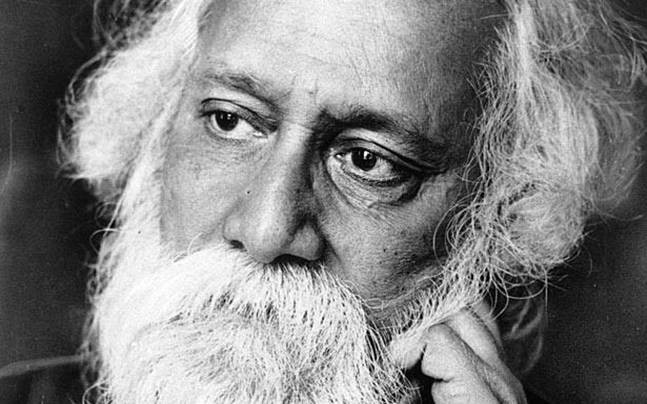 "What is needed is eagerness of heart for a fruitful communication between different cultures. Anything that prevents this is barbarism" - Tagore's view about nationalism. "What is needed is eagerness of heart for a fruitful communication between different cultures. Anything that prevents this is barbarism" - Tagore's view about nationalism. |
Secondly, most of Asian countries were under the colonial rule of Western countries during that time. Asian people felt overwhelmed by the western culture and became pessimistic. Tagore reiterated in many of his writings and speeches the new concept of Asia, which was fundamentally unique. According to him, Asian countries share many things in common, in arts, music, culture, philosophy, and painting. And the Asian feeling, its own uniqueness, were among the ideas coined by Tagore, together with the freedom to travel from country to country, with no boundaries in Asia. His messages were loved even more as he was not of any political camp, he was a pure artist.
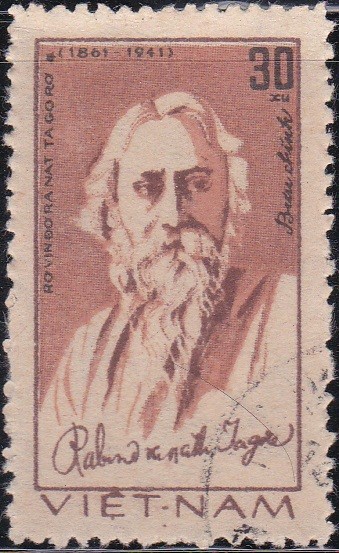 A commemorative postage stamp on Tagore issued by Vietnam on September 20, 1982. A commemorative postage stamp on Tagore issued by Vietnam on September 20, 1982. |
From the many photos taken during that trip, we can say that he was loved and welcomed by people from all walks of life in Saigon at that time. It may be for his intellect, his beautiful language, or his personality. Actually when he came to Vietnam, he insisted on wearing the local dress made from the material used by the Vietnamese during his time in Saigon. His universality was grounded in respecting the particularity of things. There are two concepts in culture called the universal and the particular. Some people maybe very universal in their approach but when it comes to the particular they may lose their identities, but Tagore possesses the beautiful combination of being both universal and particular.
VOV reporter: Thank you, Dr. G.B. Harisha, for this wonderful talk about Tagore!